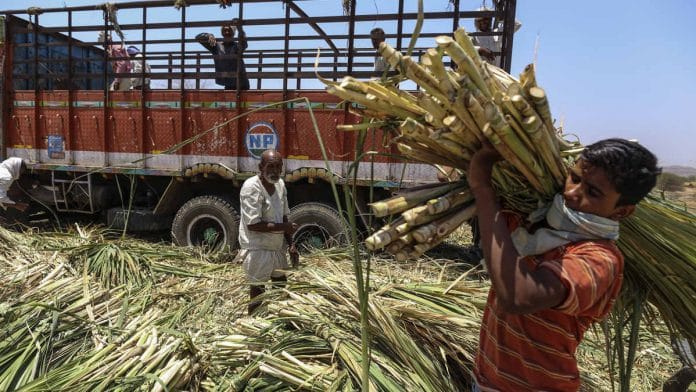Satara/Sangli/Solapur: Sugarcane growers in India’s top producing states are worried scanty rainfall during the crop’s crucial growth period could trim yields and reduce sugar output in the upcoming season, farmers and industry sources told Reuters.
Lower sugar production in Maharashtra and Karnataka, which together account for more than half of India’s total output, would reduce exports from the world’s second-biggest producer of the sweetener and support global prices trading near multi-year highs.
“Sugarcane thrives on the abundant rainfall experienced from June to September, but this year’s growth has nearly stalled due to poor rainfall,” said Bharat Sankpal, a farmer from the Satara district of the western state of Maharashtra, India’s No.1 sugar-producing state.
Key cane-growing districts of Maharashtra received up to 71% less-than-normal rainfall so far this monsoon season that started on June 1, according to the weather department data.
In neighbouring Karnataka, the third-biggest sugar producer, rainfall deficit is as high as 55% in cane-growing districts.
Sugarcane yields fell last year due to lower rainfall in June-July, and the same weather pattern is prevailing this year as well, said Shrikant Ingale, a farmer from Solapur district in Maharashtra.
Maharashtra, which was expected to produce 13.8 million metric tons of sugar in the 2022/23 marketing year ending Sept. 30, produced only 10.5 million tons due to lower cane yields.
The industry was expecting production would revive in the 2023/24 marketing year starting Oct. 1, but scanty rainfall has washed away hopes of any revival in the output, said B.B. Thombare, president of the West Indian Sugar Mills Association.
“Instead, there will be a drop in production in the upcoming season. The quantum of the drop depends on how much rainfall we receive in the next few months,” Thombare said.
Sugar output in the current year is expected to fall more than 8% to 32.8 million tons from last year.
LIMITED EXPORTS
The drop in this year’s output prompted India to cap exports at 6.1 million tons after exporting over 11 million tons a year ago.
The uncertainty is rising about the next season’s exports as it seems production would fall and local prices would rise, said a Mumbai-based dealer with a global trade house.
“The government’s current priority is to bring down inflation. Lower production means it will allow very small amount for exports in the next season,” the dealer said.
The government is keen to control food prices ahead of some state elections in 2023 and a general election in mid-2024, he said.
Scanty rainfall has not only been affecting standing crop, but also discouraging farmers from the new plantation as cane is a water-intensive crop, said Thombare.
Reporting by Rajendra Jadhav; Editing by Sherry Jacob-Phillips
Disclaimer: This report is auto generated from the Reuters news service. ThePrint holds no responsibilty for its content.
Also read: China’s response on joint climate action was positive – EU climate chief






